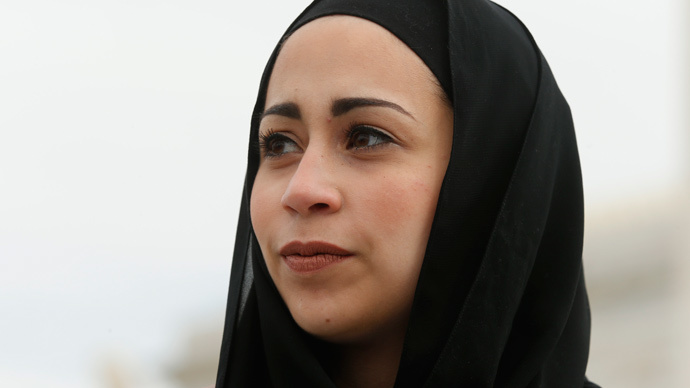SCOTUS rules in favor of Muslim woman over head scarf in Abercrombie & Fitch suit

The Supreme Court of the United States has ruled in favor of a Muslim woman who said she was discriminated against when clothing retailer Abercrombie & Fitch refused to hire her after appearing for an interview in a religious head scarf.
In an 8-1 ruling handed down Monday, the high court said
Abercrombie was at fault in failing to hire Samantha Elauf as a
result of her appearance after a job interview.
The topic of religion was never touched upon during the interview
at an Abercrombie Kids store in Tulsa, Oklahoma, but assistant
manager Heather Cooke acknowledged to her boss after the
interview that she had determined Elauf’s head scarf violated the
store’s “looks policy” prohibiting head gear.
Attorneys for the clothing store said that Elauf wasn’t rejected
on account of her religious garb, but because her look clashed
with the “classic East Coast collegiate style” that it looks for
in its employees.
READ MORE: Supreme Court considers Muslim hijab discrimination case against Abercrombie & Fitch
During the trial, SCOTUS examined whether Elauf was required to
have told her potential employer about the specific religious
accommodations she’d require in order to sue Abercrombie for
violating the anti-discrimination Civil Rights Act of 1964.
Applicants should not be allowed “to remain silent and to
assume that the employer recognizes the religious motivations
behind their fashion decisions,” Abercrombie argued in a
legal brief filed with the high court, the New York Times
reported this week.
In announcing the decision early Monday, however, the court said
it shouldn’t matter that Elauf’s religious requirements were not
specifically mentioned during the interview.
“An applicant need show only that his need for an
accommodation was a motivating factor in the employer’s decision,
not that the employer had knowledge of his need,” Justice
Antonin Scalia wrote for the majority.
A Muslim woman denied a job over her head scarf won her case in the Supreme Court http://t.co/LrFBNLdSAIpic.twitter.com/tKcrFnKcHI
— The New York Times (@nytimes) June 1, 2015
“A request for accommodation ... may make it easier to infer
motive, but it is not a necessary condition of liability,”
Scalia wrote.
Abercrombie had “at least suspected” that Elauf wore a
headscarf for religious purposes, Scalia wrote.
Federal law requires employers to “reasonably
accommodate” a worker’s religious beliefs as long as they
don’t negatively affect business. The federal Equal Employment
Opportunity Commission filed suit on Elauf’s behalf after she was
initially rejected from the job, and a jury eventually awarded
her $20,000. That verdict was called into question by a federal
appeals court, however, which said the clothing store shouldn’t
be held responsible because Elauf never specifically disclosed
her religious needs. The appeals court decision propelled the
issue to SCOTUS, where Monday’s ruling may end up being the final
word on the matter.
According to Reuters, representatives for Abercrombie said
Monday that they “will determine our next steps in the
litigation.”












